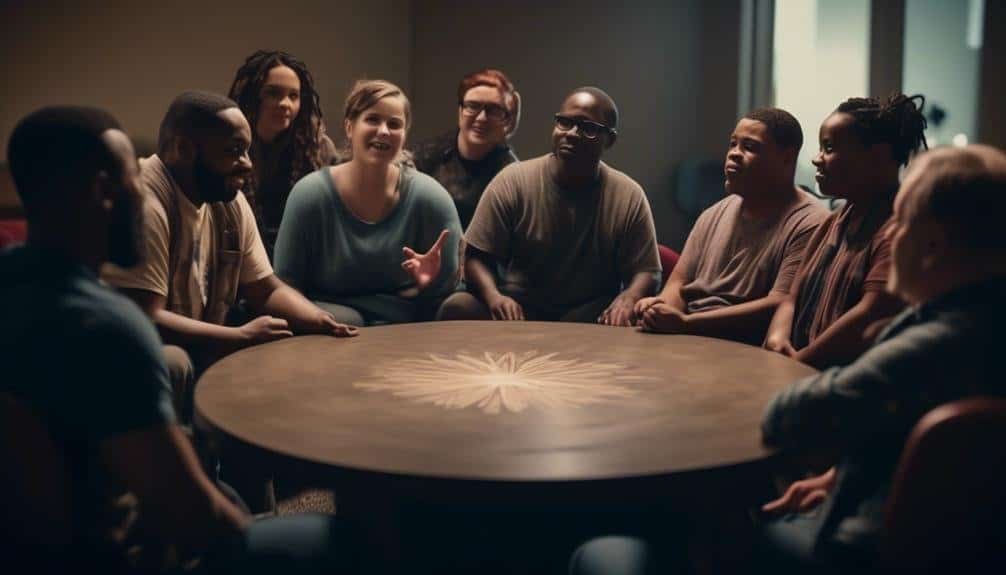Peer Support Groups for Disabilities
In a world where individuals with disabilities often face unique challenges, the value of peer support groups cannot be overstated. These groups provide a platform for individuals to connect with others who understand their experiences and offer a sense of community, support, and understanding.
The impact of such groups goes beyond mere camaraderie; they can serve as a source of empowerment, encouragement, and practical advice. Despite the growing recognition of their importance, many are still unaware of the potential benefits that peer support groups can offer.
However, the insights and connections gained from these groups can truly be transformative, and the potential for personal growth and enhanced well-being is substantial.
Key Takeaways
- Peer support groups for disabilities foster empathy, trust, and a supportive environment.
- These groups provide emotional support, validation, and contribute to mental well-being.
- Peer support groups empower individuals by offering practical advice, personal growth, and resilience.
- They create a sense of community, belonging, and connections through shared experiences.
Understanding the Role of Peer Support Groups
Understanding the role of peer support groups is essential for individuals with disabilities seeking to navigate their challenges and find a sense of community and understanding. These groups play a crucial role in fostering empathy, which is vital for creating a supportive and inclusive environment. Empathy enables members to connect with each other on a deeper level, as they can relate to each other's experiences and emotions. It allows for a more profound understanding of the challenges each individual faces, leading to increased compassion and support within the group.
Building trust is another fundamental aspect of peer support groups. Trust forms the foundation of meaningful relationships within the group and is essential for open and honest communication. Members must feel comfortable sharing their vulnerabilities and seeking advice without fear of judgment. As trust grows within the group, individuals are more likely to engage actively, seek and offer help, and share their experiences.
This supportive environment can significantly contribute to the emotional well-being and empowerment of individuals with disabilities. Overall, understanding the role of peer support groups in fostering empathy and building trust is crucial for harnessing the full potential of these communities in providing valuable support to their members.
Benefits of Joining a Peer Support Group
Peer support groups offer a myriad of advantages for individuals with disabilities, building upon the foundation of empathy and trust to provide a supportive and empowering environment.
One key benefit is the opportunity to build connections with peers who share similar experiences and challenges. This sense of connection can alleviate feelings of isolation and provide a platform for individuals to share their stories, learn from others, and develop a sense of belonging within a community.
Additionally, peer support groups offer emotional support, allowing members to express their feelings and concerns in a safe and understanding space. Sharing experiences and receiving empathy from others who truly understand the impact of disability can be immensely comforting and validating. This emotional support can contribute to improved mental well-being, reduced stress, and enhanced coping strategies.
Moreover, being part of a peer support group can provide a sense of empowerment as individuals learn from each other's successes and develop a greater sense of self-confidence and resilience in managing their disabilities.
Finding the Right Peer Support Group
When seeking a peer support group for disabilities, it is important to carefully consider the specific needs, interests, and goals that align with one's personal experiences and circumstances. Finding community and connecting with others who share similar challenges and experiences can significantly impact one's overall well-being.
To ensure that the right peer support group is found, individuals should consider the following:
- Location and Accessibility: Consider the location of the support group meetings and whether they are easily accessible. It's important to find a group that is convenient to attend, whether it's in person or virtually.
- Scope of Support: Evaluate the scope of support provided by the group. Some may focus on specific disabilities or issues, while others may offer more general support. Finding a group that aligns with one's specific needs is crucial.
- Group Dynamics: Assess the dynamics of the group and its members. It's essential to find a support group where one feels comfortable sharing and connecting with others. Understanding the group's atmosphere and whether it fosters a sense of belonging is vital in finding the right fit.
Finding the right peer support group involves thoughtful consideration of these factors to ensure a meaningful and supportive experience.
Sharing Experiences and Building Connections
Sharing personal stories within a peer support group can create a sense of connection and understanding among members. These shared experiences help in forming meaningful relationships and provide a sense of belonging.
Personal Stories Shared
By sharing personal experiences within peer support groups for disabilities, individuals can establish meaningful connections and find solidarity in their journeys. Personal stories have the power to foster personal growth, create a sense of community connections, and provide inspiration for overcoming challenges.
Imagine a young adult sharing their experience of navigating higher education with a disability, inspiring others to pursue their academic goals despite the obstacles they may face.
Picture a parent sharing their journey of raising a child with a disability, offering support and guidance to other parents who may be going through similar experiences.
Consider a veteran discussing their journey of adjusting to life after a service-related injury, providing hope and camaraderie to fellow veterans in similar situations.
Through personal storytelling, individuals in peer support groups can find strength in their shared experiences and build lasting connections.
Forming Meaningful Relationships
Within peer support groups for disabilities, forming meaningful relationships is facilitated through the sharing of experiences and the building of connections, fostering a sense of solidarity and understanding among individuals.
Building trust is a fundamental aspect of these relationships, as members disclose personal challenges and triumphs, creating a safe space for vulnerability.
Through open and honest communication, individuals embrace vulnerability, cultivating empathy and deepening their connections. This shared vulnerability allows for the development of authentic relationships, where members feel understood and supported.
Additionally, the process of sharing experiences and actively listening to others' stories fosters connections based on mutual respect and understanding.
In this environment, individuals find common ground and are able to offer genuine support, ultimately leading to the formation of lasting and meaningful relationships within the peer support group for disabilities.
Empowering Through Shared Experiences
The establishment of meaningful relationships within peer support groups for disabilities lays the foundation for empowering individuals through the shared experiences and connections they cultivate.
This empowerment is manifested through:
- Building Resilience: By sharing their experiences and learning from the journeys of others, individuals in peer support groups develop resilience in facing the challenges associated with their disabilities. This resilience comes from realizing that they are not alone in their struggles and from witnessing the strength and perseverance of their peers.
- Fostering Empathy: Through sharing their own experiences and listening to the experiences of others, individuals in these groups develop a deep sense of empathy. This empathy creates a supportive and understanding environment where members can offer and receive genuine compassion and encouragement.
- Creating a Sense of Community: The shared experiences and connections formed within peer support groups foster a sense of belonging and community, where individuals feel understood and valued, further contributing to their empowerment.
Peer Support Group Activities and Resources
Ideally, peer support group activities and resources should be designed to foster a sense of community, provide practical assistance, and promote personal growth among individuals with disabilities. Group discussions play a crucial role in peer support groups, allowing members to share their experiences, challenges, and coping strategies. These discussions provide a platform for individuals to express their feelings, seek advice, and learn from one another's experiences, fostering a supportive and understanding environment.
In addition to group discussions, creative activities and bonding exercises can be instrumental in enhancing the cohesion and camaraderie within the peer support group. Engaging in creative activities such as art therapy, music sessions, or storytelling workshops can serve as a therapeutic outlet for individuals with disabilities, fostering self-expression and emotional healing. Bonding exercises, such as team-building activities or outdoor excursions, can strengthen the relationships among group members, creating a sense of unity and mutual support.
Furthermore, resources such as informational workshops, access to assistive technologies, and referrals to relevant services can provide practical assistance to individuals with disabilities, empowering them to overcome challenges and improve their quality of life. By incorporating a diverse range of activities and resources, peer support groups can effectively cater to the multifaceted needs of their members, fostering a supportive and empowering environment for individuals with disabilities.
Overcoming Challenges Together
Collaboratively addressing the obstacles encountered by individuals with disabilities is a fundamental aspect of peer support group dynamics. Within a supportive community, members come together to overcome challenges, fostering a sense of collective empowerment. This collective empowerment is manifested in several ways, including:
- Shared Experiences: Members share their personal experiences and strategies for overcoming obstacles, creating a sense of solidarity and understanding within the group.
- Mutual Support: Group members offer each other practical and emotional support, providing a safety net and a source of strength during difficult times.
- Collective Problem-Solving: The group collaborates to identify common challenges and devise creative solutions, drawing on the diverse perspectives and expertise of its members.
Navigating Relationships and Support Systems
Pioneering peer support groups for disabilities extends beyond addressing challenges collectively; members also navigate relationships and support systems to foster a comprehensive network of assistance and understanding. Navigating friendships within the context of a disability can be complex, often requiring patience, empathy, and a deep understanding of individual needs. Building trust within these relationships is paramount, as it forms the foundation for a supportive and understanding network.
| Strategies for Navigating Relationships and Support Systems | Benefits |
|---|---|
| Open communication and active listening | Fosters understanding and empathy |
| Establishing boundaries and mutual respect | Promotes healthy and respectful interactions |
| Encouraging shared experiences and social activities | Strengthens bonds and reduces feelings of isolation |
Sustaining Well-being and Positive Growth
How can individuals with disabilities sustain their well-being and cultivate positive growth within the framework of peer support groups?
- Mental Health: Peer support groups provide a safe space for individuals with disabilities to discuss their mental health challenges openly. Sharing experiences and coping strategies with peers who understand their unique struggles can significantly enhance mental well-being.
- Self-Care Practices: Being a part of a peer support group encourages individuals to prioritize self-care practices. Whether it's through regular group activities or one-on-one interactions, members can learn and exchange self-care techniques, such as mindfulness exercises, stress management, and relaxation methods.
- Positive Affirmation and Validation: Peer support groups foster an environment of positive affirmation and validation. By receiving encouragement and understanding from their peers, individuals with disabilities can experience a boost in self-esteem, leading to positive personal growth and development.
Conclusion
In conclusion, peer support groups for disabilities play a crucial role in fostering a sense of community and understanding among individuals facing similar challenges. By sharing experiences and resources, members can overcome obstacles and sustain well-being.
Joining a peer support group can lead to positive growth and provide the necessary support in navigating relationships and support systems. Overall, peer support groups offer a valuable opportunity for individuals to connect, learn, and thrive together.






